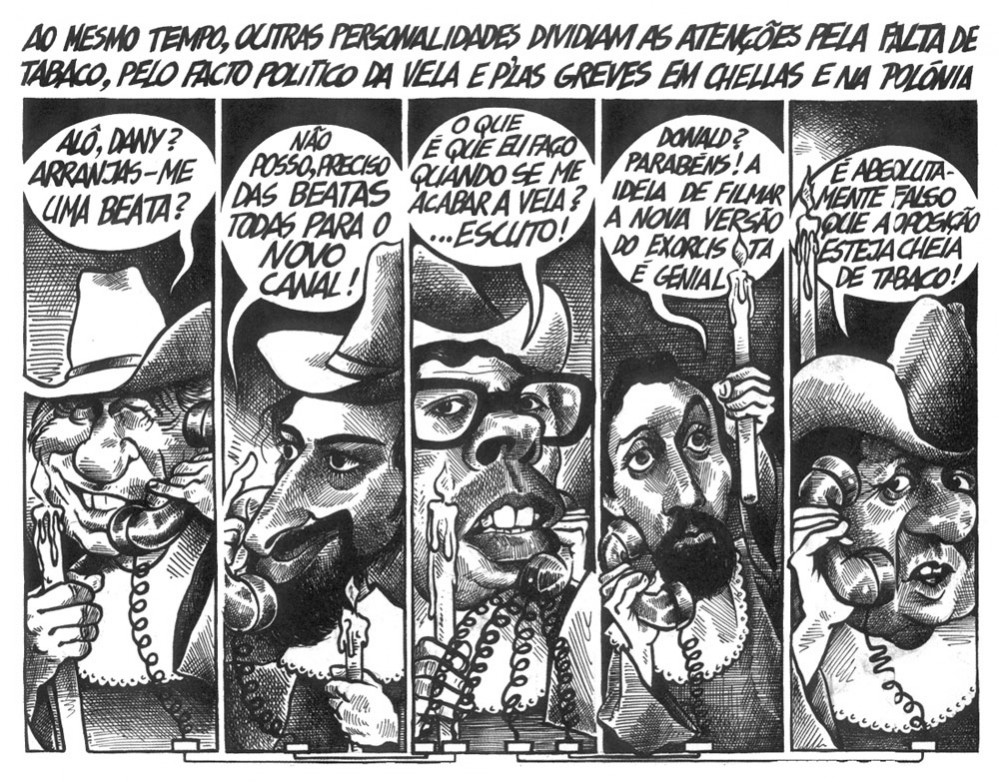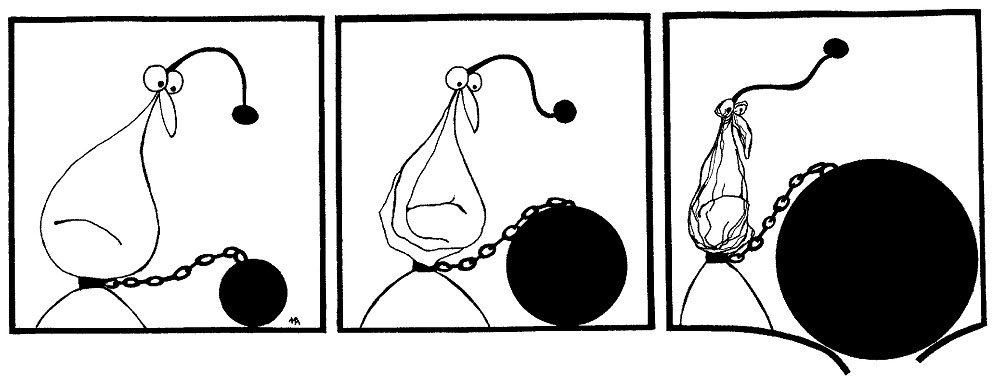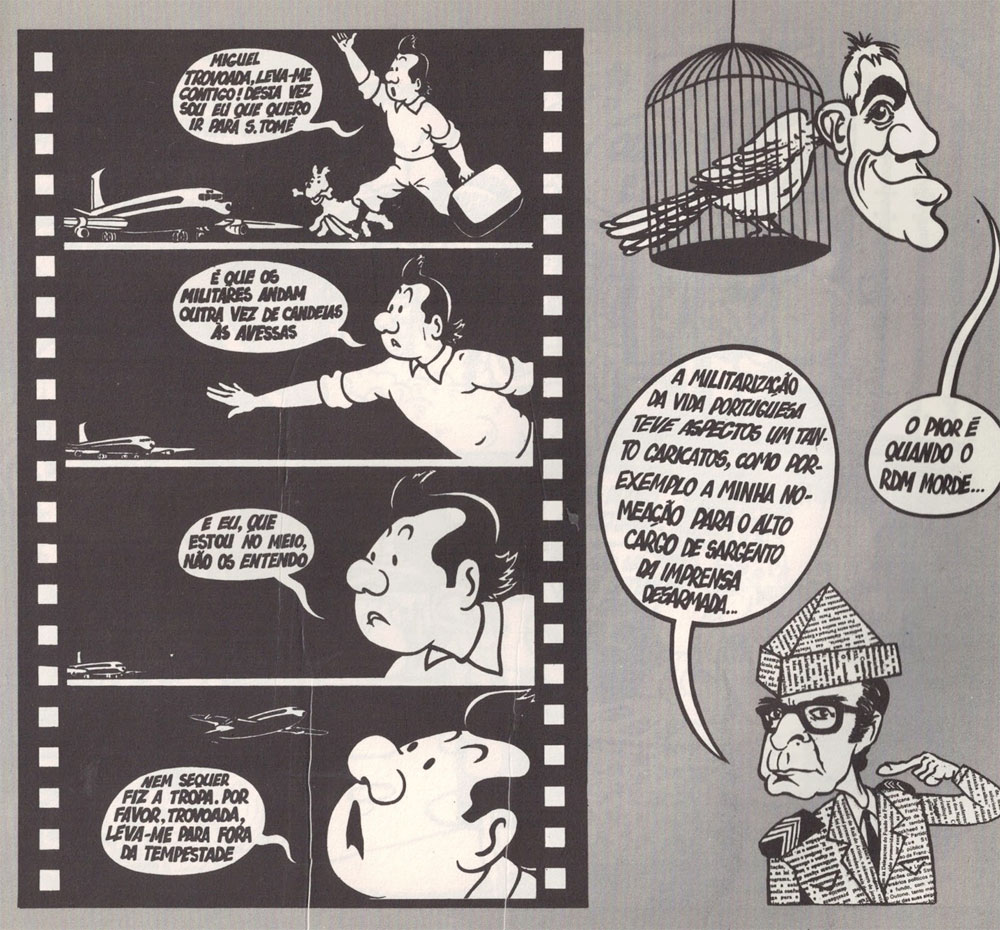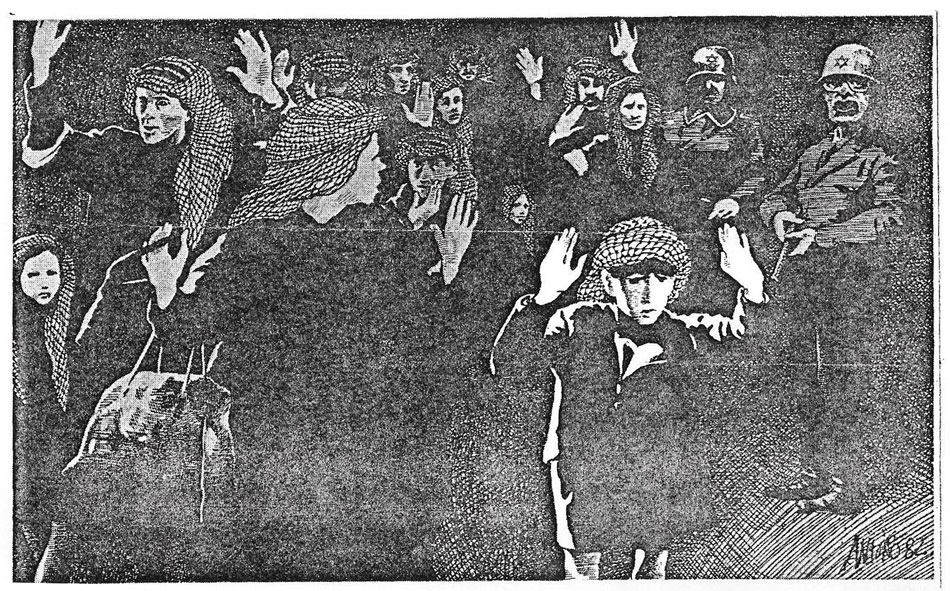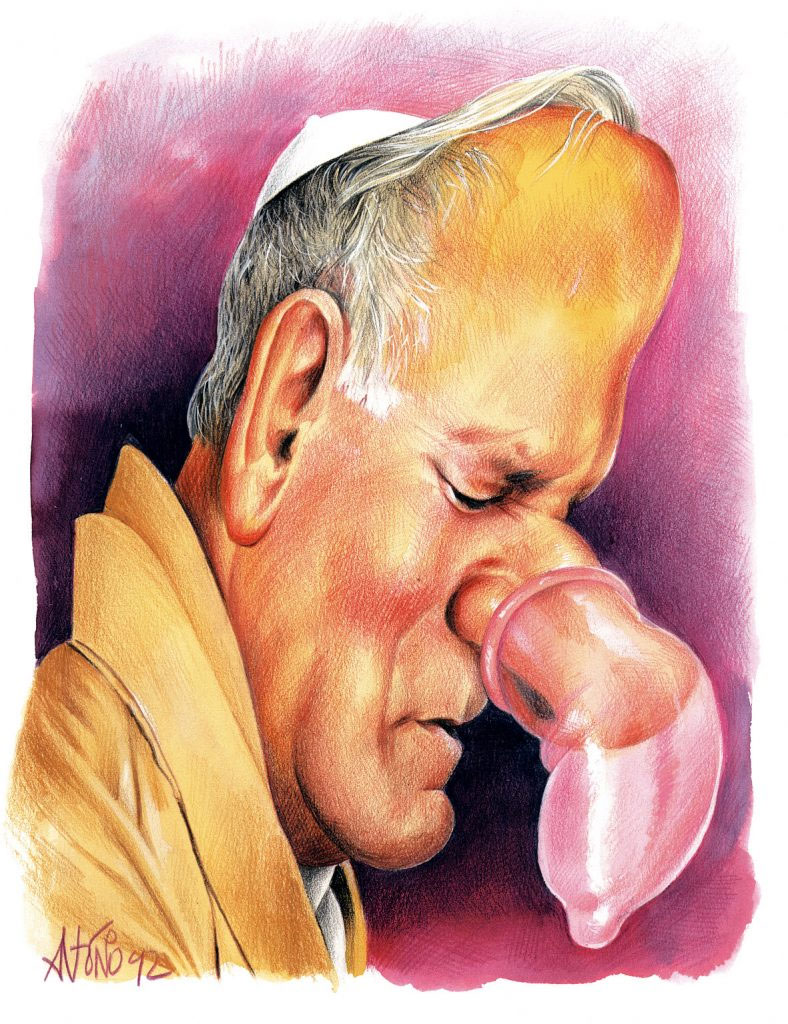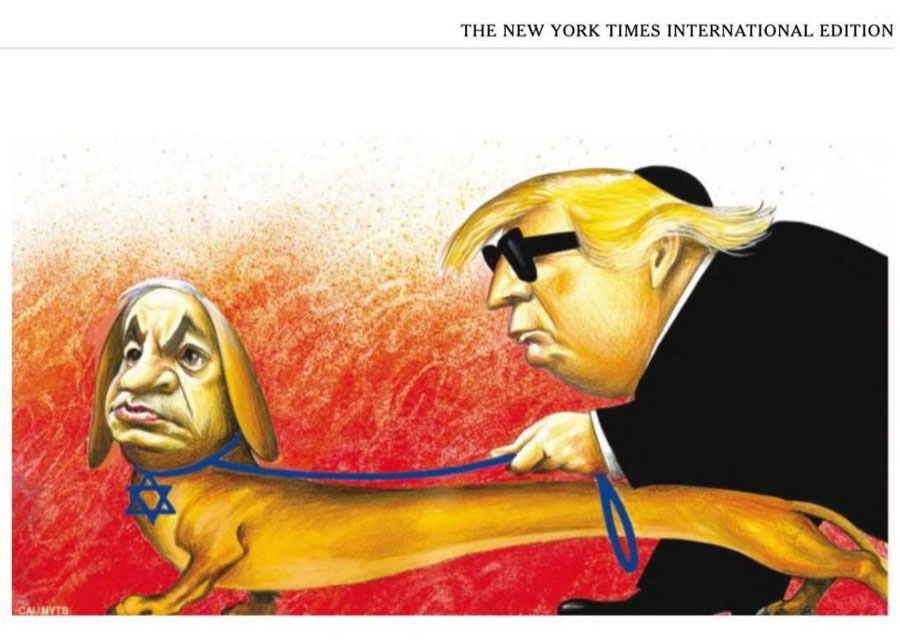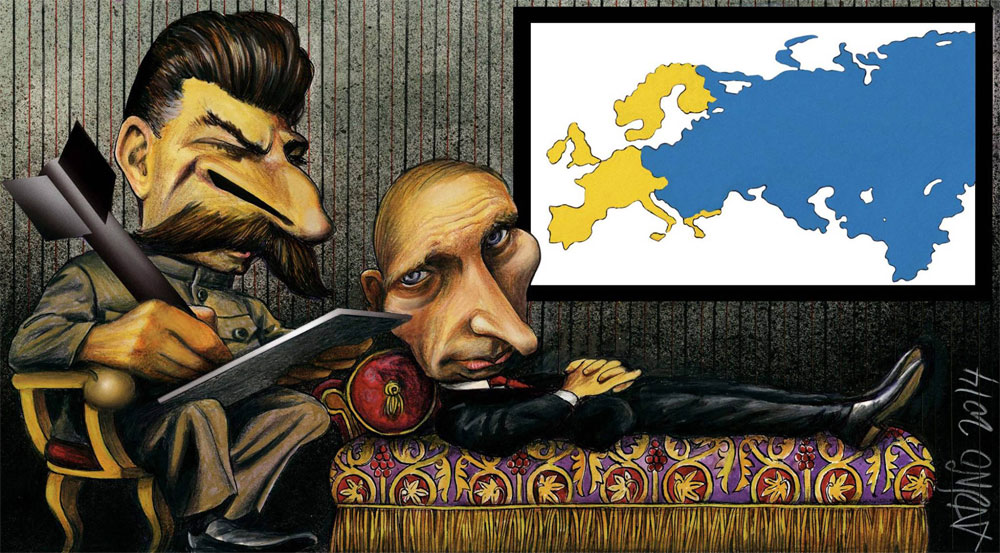António is a Portuguese caricaturist and political cartoonist whose work has often been subject of controversy. He sparked outrage with a 1993 cartoon ridiculing the pope and his stance on his anticonception, while a 2019 cartoon criticizing U.S. president Trump and Israeli Prime Minister Netanyahu led to such fierce protests that The New York Times rather drastically decided to refrain from publishing political cartoons in its pages entirely. Yet António's work has equally often been honored with awards and exhibitions. While the majority of his work are one-panel cartoons, he drew a satirical comic, 'Kafarnaum' (1976), lampooning Portuguese politics.
'Evolución de la continuidad' (1974).
Early life and career
António Moreira Antunes was born in 1953 in Vila Franca de Xira in Portugal. He grew up under the dictatorial regime of Antonio Salazár and his successor Marcelo Caetano, which shaped his political consciousness and rebellious attitude. Originally, António's father insisted that his son would become an engineer, but his teacher noticed that António had graphic talent and therefore convinced his parents to let him aspire to an artistic career instead. From 1969 on, António studied painting at the António Arroio Art School in Lisbon. Nevertheless, he gave up painting in favor of drawing caricatures and political cartoons, since cartoons "have a greater impact on society".
He published his first cartoon in the newspaper República on 16 March 1974. A month later, the Carnation Revolution broke out, ousting Caetano from power and bringing the country back to democracy. This created a climate where António could be more outspoken in his political opinions. In December of that same year, he became house cartoonist of the newspaper Expresso. His cartoons have additionally appeared in Portuguese newspapers like Diário de Notícias, A Capital, A Vida Mundial and O Jornal.
'Kafarnaum', featuring a parody of Tintin.
Kafarnaum
On 4 November 1975, António published a serialized satirical comic series, 'Kafarnaum', in Expresso. The series satirized Portuguese politics in the aftermath of the Carnation Revolution the previous year. 'Kafarnaum' was controversial since, alongside the ultraconservative supporters of the dictatorial regime, António also addressed the down sides since the return of democracy, such as the political chaos. In 1976, the comic was published in book format by Jornal Expresso.
Controversial cartoon parodying the famous 'Arrest of Jewish citizens in the ghetto of Warsaw, 1943' photograph, 1983.
Controversy
António's work has often caused outrage. In 1983, he parodied the iconic 1943 photo of Nazis arresting Jewish citizens in the ghetto of Warsaw by changing the Nazi soldiers into Israeli soldiers holding Lebanese women and children under fire. The cartoon referenced the 1982 Israeli-Lebanese War and naturally sparked some protest among certain Jewish and pro-Israel readers. Yet others recognized the satirical touch and the drawing won first prize at the International Salon of Cartoons in Montréal that year. Interestingly enough, Belgian cartoonist Gal (Gerard Alsteens) made a similar parody cartoon a year earlier, which also used the iconic ghetto photo to criticize Israel's military actions in Lebanon. His cartoon depicted Israeli Prime Minister Menachem Begin as one of the soldiers, while U.S President Reagan just stands by in the back. Gal's cartoon also sparked angry readers' letters, with several readers of Knack cancelling their subscriptions.
On 5 December 1992, António created a cartoon depicting Pope John Paul II with a condom hanging on his elongated nose. It criticized the Vatican's stance against anticonception. The cartoonist was directly inspired by the pope's visit to Uganda, where the church leader stated that "sexual chastity - not condoms - were the only way to put an end to the AIDS epidemic." After the cartoon was printed in Expresso, it caused instant controversy. Hundreds of angry readers' letters flooded the publication, while more than 29,000 signatures were collected to ban the drawing. António's contested cartoon was discussed in the Portuguese parliament, while also receiving considerable coverage in the international press.
Cartoon depicting Pope John Paul II, 1992, which caused controversy at the time.
On 25 April 2019, António created a cartoon for Espresso depicting U.S. President Donald Trump as a blind man being led by his dog Israeli Prime Minister Benjamin Netanyahu. The tiny detail that Trump wears a yarmulke in the cartoon while Netanyahu's dog collar depicts the Star of David led to quite some readers accusing the cartoon of being antisemitic. When published in The New York Times, it sparked immediate condemnations by Jonathan Greenblatt, head of the Anti-Defamation League and Trump's son, Donald Trump Jr. António felt the need to explain his cartoon, when interviewed in the Daily Caller: "The reading I made is that Benjamin Netanyahu's politics, whether by the approach of elections or by being protected by Donald Trump, who changed the embassy to Jerusalem by recognizing the city as capital, and which first allowed the annexation of the Golan Heights and after the West Bank and more annexations in the Gaza Strip, which means a burial of the Oslo Accord, it represents an increase in verbal, physical and political violence," he continued. "It is a blind policy that ignores the interests of the Palestinians. And Donald Trump is a blind man. The Star of David [Jewish symbol] is an aid to identify a figure [Netanyahu] that is not very well known in Portugal." He defended himself by saying he has "utmost respect for the past of the Jewish people, but that this doesn't mean Jewish people are above criticism. The Jewish right doesn't want to be criticized, and therefore, when they say: "We are a persecuted people, we suffered a lot... this is antisemitism." He also pointed out that the cartoon discusses a political issue rather than a religious one, criticizing the perceived pro-Israel bias of the Trump administration.
Controversial cartoon depicting Israeli Prime Minister Benjamin Netanyahu as a dog, held on a leash by U.S. President Donald Trump, 25 April 2019.
Espresso stood behind António, saying that their newspaper "has always defended freedom of expression and opinion, principles we will never renounce." They rejected any assumptions that the cartoon was antisemitic, particularly since António is "an internationally awarded cartoonist." Yet they did apologize to "members of the Jewish community and those who might have felt offended," saying "it was never intended to portray Israel or the Jewish religion and its believers in a less dignified manner." António was also defended by Israeli cartoonist Shay Harka, who parodied the offensive cartoon by replacing blind Trump's head with a New York Times copy, while his dog now has the face of the antisemitic hoax book 'The Protocols of Zion'. U.S. cartoonist A.F. Branco also spoofed the cartoon, by turning Trump into a radical left person and the dog into the N.Y. Times, but dressed in a Ku Klux Klan hood, which reads the word "antisemitism".
However, the New York Times took the protests very seriously. They issued a public apology, yet only a few days later, on 30 April 2019, another offensive cartoon depicting Netanyahu appeared in their pages, this time drawn by Norwegian cartoonist Roar Hagen. The drawing shows Netanyahu as Moses ascending the mountain, but instead of the Ten Commandments he holds the Israeli flag logo and a selfie stick. The cartoon implies that he's less concerned about his country and more about his public image. Naturally more controversy rose and U.S. President Trump tweeted: "The New York Times has apologized for the terrible antisemitic Cartoon, but they haven't apologized to me for this or all of the fake and corrupt news they print on a daily basis. They have reached the lowest level of 'journalism,' and certainly a low point in @nytimes history!"
On 10 June 2019, The New York Times announced a very drastic measure: they would quit publishing political cartoons from 1 July on. This news met with even larger controversy. Critics accused the paper of promoting censorship and punishing all other cartoonists in its pages, even the ones who had remained neutral about the whole affair. Some critics wondered why the chief editor didn't just resign, instead of using cartoonists as a scapegoat. Patrick Chapatte, one of the paper's cartoonists now suddenly fired, condemned António's cartoon, but expressed concern that media outlets increasingly buckled under political pressure and criticism from moralistic mobs on social media with a lynching mentality. As he explained on his website: "Over the last years, some of the very best cartoonists... lost their positions because their publishers found their work too critical of Trump. Maybe we should start worrying." French cartoonist and founder of the Cartooning for Peace charity, Jean Plantu, added that he was worried "that the future of our democracies and freedom of opinion. One cannot imagine a newspaper without political caricatures. Humor and unsettling images are part of our democracy. Not having biting cartoons is as stupid as asking children not to draw for Mother's Day." U.S. cartoonist Ted Rall spoke with António, who informed him that the New York Times had never talked to him about the controversial cartoon, nor asked him whether it was antisemitic or not. Rall went through the effort of asking the paper's editors directly, but received no reply. In an editorial from New York Times editor Stacy Cowley, Cowley revealed that she had tried to reach the editors of António's paper in Portugal, but to no avail. Since she faced a deadline, she was forced to leave the situation as it was.
All the concerns became even more outspoken when, within the same month, on 30 June 2019 - Canadian cartoonist Michael de Adder also saw his contract terminated by Brunswick News Inc. over a controversial cartoon criticizing Trump. On 18 July of that same year, the British newspaper The Guardian also refused to publish a cartoon by Steve Bell, which depicted British politician Tom Watson, seeking for "unholy antisemitic tropes" and scrutinizing Netanyahu.
Graphic contributions
During the 1980s, António made a limited series of ceramic images and playing cards depicting Portuguese politicians. On 17 July 2012, a series of caricatures of famous Portuguese people by António, decorating the station to the Lissabon airport, was revealed to the public. Interviewed by Rodrigo Baptista for Sic Noticias (16 July 2012), António said that he deliberately chose 53 famous fellow country members who did something positive for the nation, including fado singer Amália Rodrigues, guitarist Carlos Paredes, physician Egas Moniz, poet Fernando de Pessoa, painter Maria Helena Vieira da Silva, football player Eusébio and aviators Sacadura Cabral and Gaco Coutinho. Working on such a large scale was quite a challenge for him, since most of the time his drawings are small.
António is also a member of Cartooning for Peace.
Recognition
In 1983, António won the Grand Prix at the XX International Cartoon Show in Montréal. He received the Grand Prix d'Honneur at the XV Festival du Dessin Humoristique in Anglet, France, in 1993 and the Award of Excellence of the 20th edition of "the Best of Newspaper Design SND" in Stockholm, Sweden, in 1995. In 1994, a special book was published, '20 Anos de Desenhos', where 200 artists paid tribute to António's life and career. He ended ex-aequo winning the Premio Internazional Satira Politica in Fort dei Marmi, Italy, in 2002. On 9 March 2005, António was named 'Grand Officer in the Order of Dom Henrique', while on 11 April 2023 he received the national honorary sign of Commandeur in the Order of Peace.
In May 1999, António established the Xira Cartoon Festival, which is still held in his birth town Vila Franca de Xira every year. Every edition invites an international artist as guest, complete with an exhibition highlighting his work. Since their foundation in 2005, he additionally serves as the chairman of the jury and director of the annual World Press Cartoon Awards.
António's cartoons have been exhibited in Lisbon, Porto, Rio de Janeiro, Bonn, Düsseldorf, Macau, Brasília, Barcelona, Recife, Madrid, Paris and Saint-Just-le-Martel. Between 24 September and 17 December 2023, his work was exhibited in the European Cartoon Center in Kruishoutem, Belgium. On 23 June 2024, the town Vila Franca de Xira honored the 50th anniversary of António's career with a large retrospective, held in the Museum of Neorealism.
Cartoon depicting Russian president Vladimir Putin receiving psychiatrical advice about his megalomania from - ironically - Joseph Stalin.


